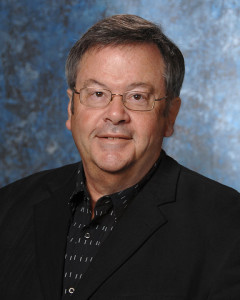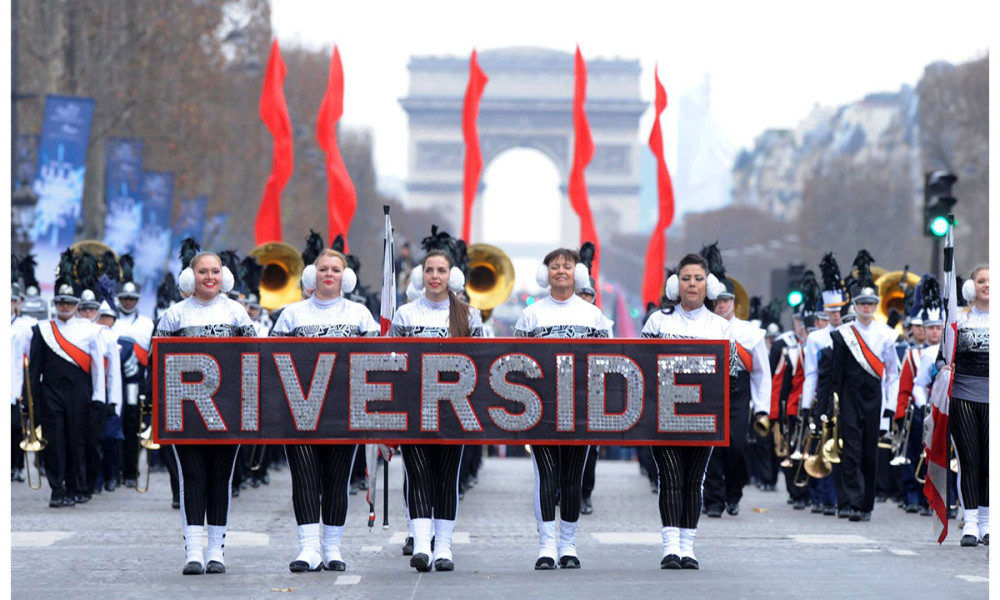Known as “Hollywood’s Band,” the Riverside City College Marching Tigers have made a name for itself all around the world under the leadership of Gary Locke, who will retire this year.
 For the past 32 years, Gary Locke has been the director of the Riverside City College (RCC) Marching Tigers in California. With help from his wife, Sheila—who is the assistant band director—Locke has built up a band that has traveled the world, graced the silver screen, and become one of the premier marching organizations in the country. Most recently Locke and the Marching Tigers arrived home from a New Year’s trip to Paris in which they performed for a crowd of hundreds of thousands at the Arc de Triomphe. The Lockes will retire at the end of this academic year.
For the past 32 years, Gary Locke has been the director of the Riverside City College (RCC) Marching Tigers in California. With help from his wife, Sheila—who is the assistant band director—Locke has built up a band that has traveled the world, graced the silver screen, and become one of the premier marching organizations in the country. Most recently Locke and the Marching Tigers arrived home from a New Year’s trip to Paris in which they performed for a crowd of hundreds of thousands at the Arc de Triomphe. The Lockes will retire at the end of this academic year.
Halftime: What’s your musical background?
Locke: I attended La Serna High School in Whittier, California. I was president of the marching band, won the John Philip Sousa award, and even played in a rock band on the side. I attended the University of Redlands (California), where I majored in music and got to do a lot of traveling as well as performing in a variety of ensembles.
Halftime: How did you become director at RCC?
Locke: My total career as a teacher adds up to 44 years. The first 12 were teaching at high schools. While at the second high school, John North in Riverside, I got a call one day from someone at the college, who by the way had no band at the time, and I talked to a booster who said that they were going to try and hire me. They sought me out thinking that I would recruit kids because I was sort of a known guy in the town with my success at John North.
Halftime: What was it like when you were starting to build up the program at RCC?
Locke: Starting was probably the scariest thing I’ve ever gone through. I had to leave a successful high school program with 172 students and a ton of parent support. After several barbeques RCC hosted as a means of helping me recruit, the first night of practice only had 16 kids show up. I thought, “What … have I done?”
But the next day, I … told them that their job every day was to bring a friend. So by the time school started, we ended up with about 59 kids. It’s hard to believe going back now after all the stuff we’ve done and think that I started off with a group of just 59.
Halftime: What is the goal of the band since it’s not really to support football or to compete?
Locke: Our original charge from the college president [at the time], Dr. Charles Kane, was “to be the visible classroom for the college.”
That’s been my job for 32 years. You could have a kid who doesn’t know anything about RCC, but he sees us in the Rose Parade or he sees us at a field show, and that kid might say, “I wasn’t really thinking about going to a community college, but if the band is good, hopefully the school’s good.”
Halftime: What are your most memorable achievements with the band?
Locke: It’s difficult to choose just one. In my first year, the performance that helped solidify where the band would go from there on out was a trip we took to Europe for the Fêtes de Genève (Geneva Festival). They provided room and board, so the whole band slept in a bomb shelter underground at Geneva.
After the success of the trip, 56 of those 59 kids who went on the trip came to band camp on the first day the next year. From then on we haven’t looked back. By the end of the second year and beginning the third year, we broke 100 members, and it just kept growing.
One of the best things ever was getting in the Rose Parade. We’ve been in it [eight times] now, but the first year we did [1990] was extra special. To get in the Rose Parade, you need a letter of recommendation from your peers and the community.
So Gordon Henderson, the UCLA director, wrote a letter to the city and said, “There’s nothing junior about this junior college band.”
That’s always been a good way of describing our program.
Halftime: RCC has also expanded into other marching programs with great success. Tell us about those ensembles.
Locke: We also have Fantasia, a [five-time champion] WGI winter guard, and we have RCC Indoor Percussion, which has [also] won the WGI championship five times. We won last year and got the highest score ever in the history of WGI. So we’re not just the fall band; we’re a whole program.
DCI is the next logical extension. … We host the longest running DCI show west of the Mississippi; I’ve hosted the show for the past 32 years. We also host the WGI regional for color guard, and in the past, we’ve done percussion as well.
Halftime: The RCC Marching Tigers is known as “Hollywood’s Band.” What are some of the notable gigs the band has done?
Locke: There are quite a handful. We’ve done more than 20 movies and almost 30 commercials. We once played for a Halloween party at the home of Kirstie Alley when she was the big star of “Cheers.” We played at The Beverly Hilton Hotel for the 40th anniversary of the country of Israel. We were the marching band for Weird Al Yankovic’s recent “Sports Song” music video.
One of the most memorable moments was when we did the movie “Wag the Dog.” We were the military band in that movie, and because the band in the film was being conducted by Huey Lewis, I ended up backstage standing next to Dustin Hoffman eating strawberries while my band shot the scene.
Halftime: How have you enjoyed working with your wife all these years?
Locke: One of the highlights of the whole experience has to be that I got to do it all with my family. My wife’s been the boss; she knows everything about everything. She’s been by my side as we go to school, not work.
My parents were also a big help. My dad drove the equipment truck for years, and then when we got bigger and got a professional driver, he switched over to fixing instruments and cases, and my mom sewed buttons and made brownies before she passed away.
Halftime: Any final thoughts?
Locke: The best thing, really, is teaching kids that you don’t need to have the same last name to be part of a family.
The human part is that I just need to teach them how to be before I teach them about wrong notes and right notes.


